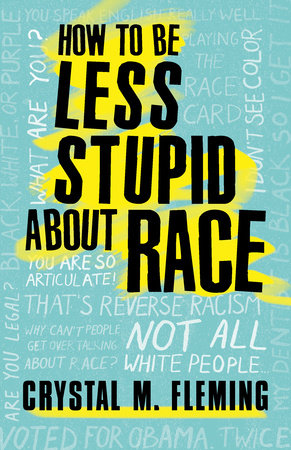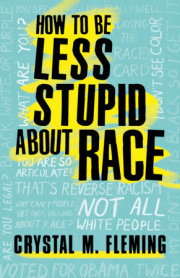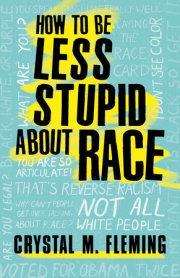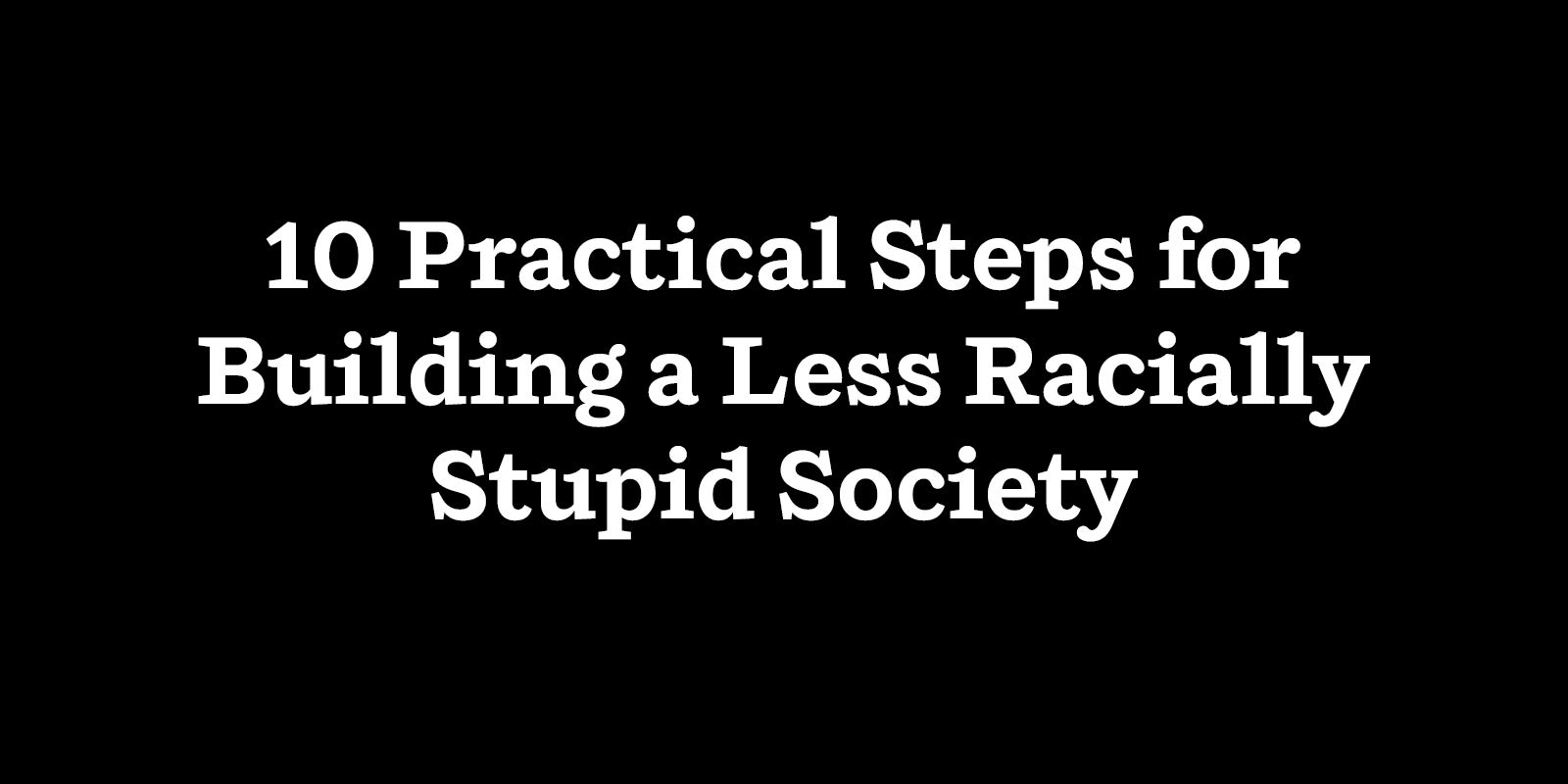THE IDIOT’S GUIDE TO CRITICAL RACE THEORY
Some of the best and most insightful scholarship on racism issequestered in a lively academic field known as critical race theory, or CRT. Predictably, this revelatory work has been ma-ligned by tin-foil-hat-wearing white supremacists who believe that the only kind of racism that exists is “antiwhite racism.” But critical race theory is something everyone needs to know about, not only because scholars working in this area were on the van-guard of debunking the myth of color blindness but also because they helped develop powerful theories of white supremacy as a pervasive system of racial oppression, rather than the narrow idea that white supremacy can only be found in the beliefs and prac-tices of white nationalists.Using the insights of critical race theory, I’m going to break down the “what,” “when,” “where,” “why,” and “how” of white supremacy, after which you’ll be well ahead of the vast majority of the population, who have no idea what white supremacist racism really is, where it came from, or what could possibly be done about it.
I’m going to review and simplify a lot of complex history, but here are several important things to bear in mind. First: white supremacy is, most fundamentally, a system of power designed to channel material resources to people socially defined as white. Second: white supremacy is not just neo-Nazis and white nation-alism. It’s also the way our society has come to be structured, such that political, economic, and other forms of capital are pre-dominately maintained by elite whites. Long before op-ed col-umnists and contemporary activists began using the term “white supremacy,” critical race scholars and radical progressives such as Derrick Bell, Kimberlé Crenshaw, and Cornel West were lead-ing the way with strident critiques of structural racism (and its interconnections with sexism, class oppression, and other forms of domination). Finally: white supremacy is inextricably linked to other systems of domination. This is the major insight of inter-sectionality, a concept I will come back to later. For now, simply remember that racism goes hand in hand with class oppression, patriarchy, and other forms of domination.
This chapter will also introduce you to the brilliant work of critical race philosopher Charles Mills, who has been consistently, eloquently snatching white supremacist wigs for decades. I’ll spend some time explaining his best-known concept: the epistemology of ignorance. If many of these terms are new to you, get ready to have some of your most basic assumptions about race challenged. Buckle up your seatbelt, baby: this is gonna be a bumpy ride.
If you grew up like most people in the United States (including me), you probably learned very little about the history and current realities of racism in school. If anything, you were likely taught that racism, while unfortunate, is mainly a thing of the past, some-thing to view through the rearview mirror. In his excellent books Lies My Teacher Told Me and Lies Across America, sociologist James Loewen clearly demonstrates that racial history is routinely mini-mized and distorted within our (mis)educational system. Not only is it highly unlikely that you learned much of substance about race or racism at school; it is also highly likely that you absorbed racist propaganda. To the extent that our schools typically fail to teach students how to intelligently connect the racial past to the present, many of us end up with preracial or color-blind understandings of history and society. In the introduction, I mentioned that I didn’t grow up consciously thinking about race or racism. In fact, I was so lost in the sauce in middle school that when our class read those precious few lines about slavery and the Civil War in our history book, I thought, “Gee, how sad for those people.”
Those people. As in, the enslaved Africans and their descendants—some of whom are my ancestors!Prior to going to college, I don’t recall having any teacher, from elementary on through high school, draw clear connections between past and present racism, or even acknowledge that sys-temic racism was a serious, ongoing problem in the United States (not to mention the rest of the globe!). In schools across the coun-try, young people are indoctrinated with a rosy origin myth of the United States, a lie that frames indigenous people as noble savages who happily sat down with the Pilgrims to “celebrate” Thanks-giving over turkey and squash as their people were being system-atically slaughtered through genocide.
To the extent that racial oppression is referenced at all, it is generally framed as a bad thing that happened a long time ago. One of the sad ironies of oppres-sion is that it’s completely possible to grow up in a society ravaged by multiple forms of domination and not know that your society is ravaged by multiple forms of domination, especially when our educational system manufactures feel-good histories and progress narratives. I concur with Ibram X. Kendi, who argues that our nation’s emphasis on racial progress has obscured “racist prog-ress”—the evolution of racist ideas and practices alongside anti-racist transformations.
The end result is a society where racism is routinely misrepresented, denied, and difficult to detect—unless, of course, you experience it directly and have the political and his-torical lens needed to know you’re experiencing it.This is precisely why civil rights lawyers and experts developed critical race theory: to address and redress widespread racial mis-information and to promote racial justice. Between the intentional efforts of bigots to whitewash racism and massive historical igno-rance pervading our social institutions, it’s no wonder that mil-lions of people struggle with racial denial—including the denial of racism itself. Depending on which racial idiot you ask, the United States hasn’t been racist since Obama’s election, the civil rights movement, the dawn of the twentieth century, or ever.
In 2017, former NFL player and coach Mike Ditka proclaimed that there has been “no oppression” of any kind in the last “one hundred years.” And for some misguided minorities, the gains of the civil rights movement and certainly the election of the nation’s first biracial president were interpreted as signs that significant racial barriers are no longer with us. In the wake of Obama’s 2008 elec-tion, the conservative African American linguist John McWhorter went so far as to pen an op-ed in Forbes entitled “Racism in Amer-ica Is Over.” In keeping with his long career of minimizing racism, McWhorter enthusiastically declared the end of “serious” racial oppression: “Of course, nothing magically changed when Obama was declared president-elect. However, our proper concern is not whether racism still exists, but whether it remains a serious prob-lem. The election of Obama proved, as nothing else could have, that it no longer does.”4I’m sitting here scratching my head over an author saying that his concern is not “whether racism still exists” in an article entitled “Racism in America Is Over.” Now, to be fair, it’s possible that McWhorter did not choose the title of his essay, as editors often provide the headlines, but let’s be clear: there is a logical contradiction between declaring the end of racism and then backpedaling to the more restricted (but still delusional) claim that “serious” racism no longer exists.
Copyright © 2019 by Crystal M. Fleming. All rights reserved. No part of this excerpt may be reproduced or reprinted without permission in writing from the publisher.




